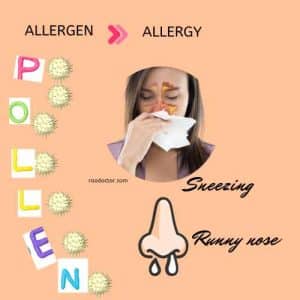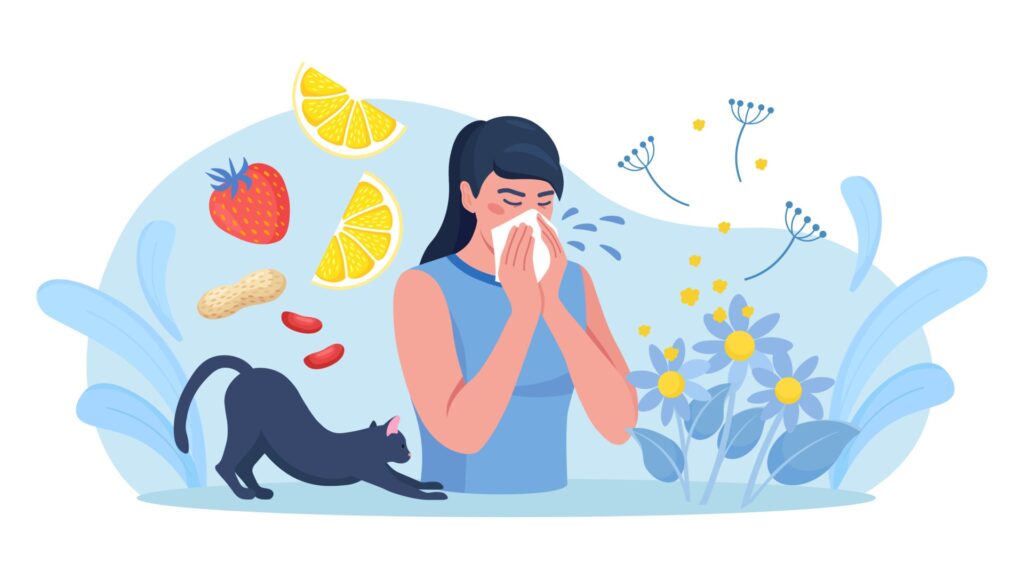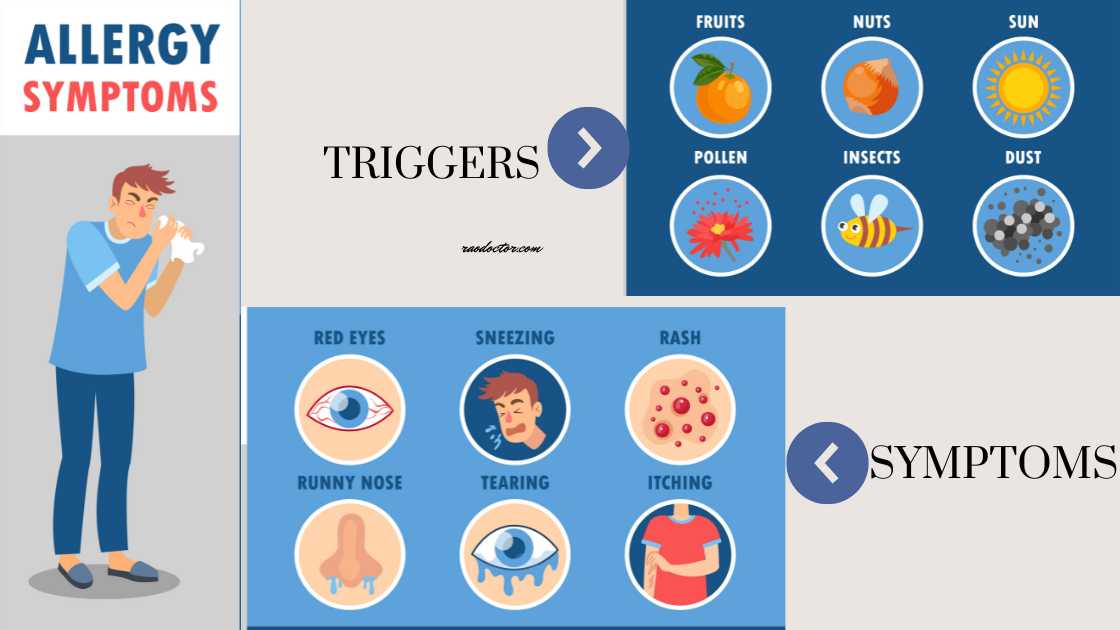Know all about allergies, its sign-symptoms, types and much more
Allergies are your body’s reaction to a foreign substance that’s not typically harmful to your body yet causes some or the other discomfort to you. These foreign substances are called allergens.
They can include certain foods, pollen, or pet dander². Your immune system produces substances known as antibodies as a response to the allergen.
These antibodies then create a plethora of symptoms and signs that range from a mild skin rash to life-threatening conditions such as anaphylaxis.
When you have allergies, your immune system makes antibodies that identify a particular allergen as harmful, even though it isn’t¹.
When you come into contact with the allergen, your immune system’s reaction can inflame your skin, sinuses, airways, or digestive system¹.
The severity of allergies varies from person to person and can range from minor irritation to anaphylaxis — a potentially life-threatening emergency¹.
What are the signs and symptoms of allergies?
Some of the common symptoms of allergies are: –

- Sneezing
- Itching of the nose, eyes, or roof of the mouth
- Runny, stuffy nose
- Watery, red or swollen eyes (conjunctivitis)
- Hives
- Swelling of the lips, tongue, face, or throat
- Cough, chest tightness, wheezing or shortness of breath
- Anaphylaxis- a life-threatening allergic reaction
Causes of Allergies

Some of the common causes of allergies are:
- Pollen from flowers of trees, grasses and weeds
- Dust mites, cockroaches, and mold spores
- Animal dander and saliva
- Insect stings and bites
- Certain foods, such as peanuts, tree nuts, milk, eggs, fish, shellfish, soy, and wheat
- Certain medications, such as penicillin, aspirin and ibuprofen
- Latex and other substances that touch the skin²
How to diagnosis allergy?
Allergies can be diagnosed by a doctor who will ask about your symptoms, medical history and family history. The doctor may also perform a physical exam and some tests to confirm the diagnosis. Some of the tests are:

- Skin prick test: A small amount of a suspected allergen is pricked on the skin and the reaction is observed after 15 minutes.
- Blood test: A sample of blood is sent to a lab to measure the level of IgE antibodies to specific allergens.
- Oral food challenge: A small amount of a suspected food allergen is given to the patient under medical supervision and the reaction is monitored.
- Patch test: A patch [as shown above] containing a suspected allergen is applied to the skin and removed after 48 hours to check for any signs of contact dermatitis.
How do you treat allergies
Allergies can be treated by avoiding the allergens that trigger them. However, this may not always be possible or practical.
In that case, some medications can help relieve the symptoms or prevent allergic reactions. Some of the medications that your doctor might prescribe are:
- Antihistamines: These block the effects of histamine, a chemical released by the immune system during an allergic reaction. They can reduce itching, sneezing and runny nose. Examples of antihistamines are- [pheniramine malleate [ Avil, Polaramine], desloratadine [Deslor, Sylor], cetirizine [Levocet, Cetzine], fexofenadine [ Allegra]
- Decongestants: These shrink the swollen blood vessels in the nose and sinuses and relieve congestion and pressure. Examples- Phenylephrine as in Sinarest, Wikoryl.
- Nasal sprays: These deliver steroids or antihistamines directly to the nasal passages and reduce inflammation and mucus production. Examples are- oxymetazoline [Nasivion nasal spray, Otrivin nasal spray]; azelastine
- Eye drops: These contain antihistamines or anti-inflammatory agents that soothe irritated eyes [I-kul eye drops, Vasicon eye drops].
- Allergy shots (immunotherapy): These involve injecting gradually increasing doses of a purified allergen over several months or years to desensitize the immune system and reduce allergic reactions. These shots are available from physicians who treat allergies based on the type of allergen you are allergic to.
- Epinephrine (adrenaline): This is a life-saving medication that can reverse the symptoms of anaphylaxis. It can be given by injection using an auto-injector device that should be carried by people with severe allergies at all times. Know more about Epinephrine.
Are there natural remedies to treat allergies?
Some natural remedies that may help with allergies are:
– Saline nasal irrigation: This involves rinsing the nasal passages with a saltwater solution to flush out allergens and mucus.
– Butterbur: This is an herb that may have anti-inflammatory and antihistamine properties. However, it may also cause side effects and interact with other medications.
Some studies of butterbur root or leaf extracts suggest that they may be helpful for symptoms of hay fever (allergic rhinitis), but the data are not convincing.
NCCIH
– Quercetin: This is a plant pigment that may inhibit histamine release and reduce inflammation. However, it may also cause side effects and interact with other medications.
– Bromelain: This is an enzyme found in pineapple that may reduce swelling and inflammation in the nose and sinuses. However, it may also cause side effects and interact with other medications.
How can you prevent allergic attacks?
Allergies can be prevented by avoiding or minimizing exposure to allergens. Some of the ways to do this are:
- Stay indoors when the pollen count is high and keep windows and doors closed.
- Use a high-efficiency particulate air (HEPA) filter in your home and vacuum regularly.
- Wash your bedding and curtains in hot water and use dust mite-proof covers on your mattress and pillows.
- Keep your pets out of your bedroom and off your furniture and wash them frequently.
- Wear protective clothing and gloves when handling substances that may cause contact dermatitis.
- Read food labels carefully and avoid foods that you are allergic to or that may contain traces of allergens.
- Carry an epinephrine auto-injector with you if you have a history of anaphylaxis and know how to use it in case of an emergency²
What are complications of an allergic reaction?
Allergies can cause complications such as:
Asthma:
This is a chronic condition that causes inflammation and narrowing of the airways, leading to wheezing, coughing and difficulty breathing. Allergies can trigger or worsen asthma symptoms in some people.
Sinusitis:
This is an infection or inflammation of the sinuses, the air-filled cavities behind the nose, cheeks, and forehead. Allergies can cause congestion and mucus buildup in the sinuses, creating a favorable environment for bacteria or fungi to grow.
Otitis media:
This is an infection or inflammation of the middle ear, the space behind the eardrum. Allergies can cause swelling of the eustachian tube, the passage that connects the middle ear to the throat and impairs its function of draining fluid from the ear.
Eczema:
This is a chronic skin condition that causes dry, itchy and inflamed patches of skin. Allergies can trigger or worsen eczema symptoms in some people.
Anaphylaxis:
This is a severe allergic reaction that can affect multiple organs and systems in the body. It can cause symptoms such as low blood pressure, rapid pulse, swelling of the throat, difficulty breathing, nausea, vomiting, diarrhea, dizziness and loss of consciousness. It can be fatal if not treated promptly with epinephrine²
Conclusion
Allergies can be a very uncomfortable condition that can cause discomfort, runny nose, mucus, sneezing and itching. The most common types of allergies are allergic rhinitis, hay fever or eczema.
We have already discussed about treatment and prevention of allergy in this article. Just follow them and learn to tackle them before visiting a physician.
Final words
This article was on how and why allergies occur and what can be done about it. My next article will be on how some foods trigger allergies of the gastrointestinal intestinal system.
If you have this article useful, do share it using the social media channels at the bottom of this article. Alternately, you can click to tweet below-
What are allergies? Share on XUseful Resources:
Use these resources to learn in detail about allergies and their management-
(1) Allergies Overview: Symptoms, Treatments, and More – Healthline. https://www.healthline.com/health/allergies.
(2) Allergies – Symptoms and causes – Mayo Clinic. https://www.mayoclinic.org/diseases-conditions/allergies/symptoms-causes/syc-20351497.
(3) Are Allergies Hereditary? Everything You Need to Know – Verywell Health. https://www.verywellhealth.com/are-allergies-hereditary-5198808.
(4) Allergies: Symptoms, Reaction, Treatment & Management – Cleveland Clinic. https://my.clevelandclinic.org/health/diseases/8610-allergies.

